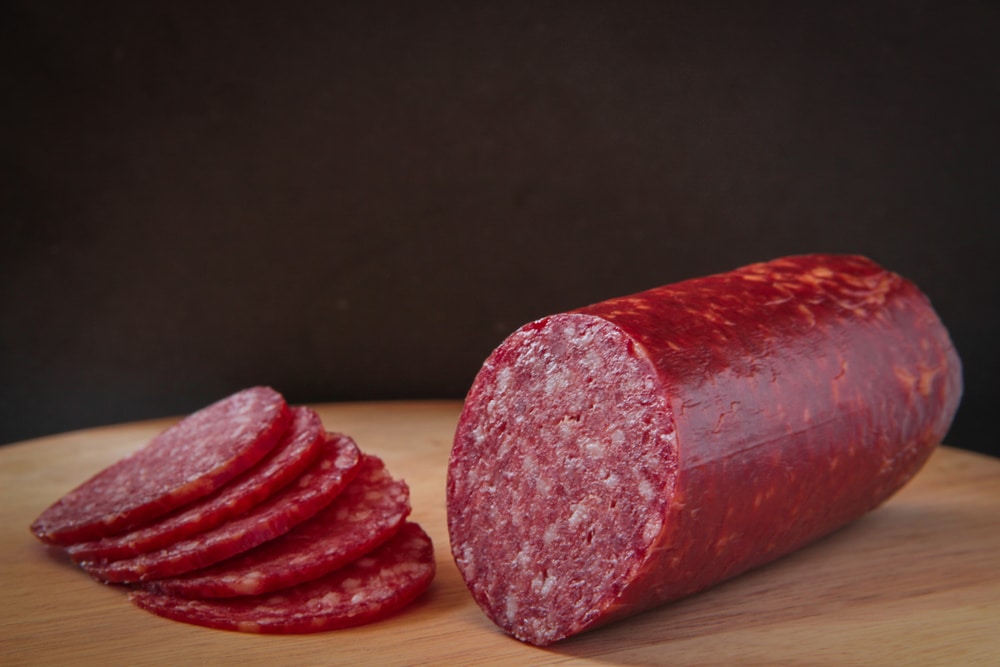Dogs are renowned for their food love and curiosity, but some foods can harm their health. From kibble and canned foods to table scraps, their ability to enjoy any meal is legendary. But can dogs eat salami?
Dogs should not eat salami. Salami, usually made from pork, beef, or veal, contains a lot of fat and salt, both of which are unhealthy for your dog. Excessive amounts of fat can lead to pancreatitis and other digestive issues, while too much salt can cause dehydration in dogs. Additionally, salami often contains spices and preservatives unsuitable for dogs, such as garlic and onion.
Table of Contents
What Is Salami?

Salami is a cured, air-dried sausage made from pork, beef, or veal. Originating in Italy, it has now become famous throughout the world. It’s typically spiced with pepper, garlic, and other spices such as fennel seed and wild fennel.
It’s also often smoked to give it its unique flavor and texture. Salami can be sliced thin and eaten as-is or added to sandwiches, pizzas, and other dishes.
Is Salami Good For Dogs?
Salami is not the healthiest food for dogs (neither is chorizo), as it is high in fat and sodium. The high levels of sodium and fat in salami could be dangerous for your canine companion, potentially leading to salt poisoning, obesity over time, high blood pressure, vomiting, diarrhea, poor appetite, or pancreatitis.
Additionally, garlic powder is often used as a seasoning, which is highly toxic to dogs – making it essential to avoid any products with this ingredient. Both of these conditions are serious health risks and should be taken seriously.
Why Shouldn’t Dogs Eat Salami?
Dogs are often known for their love of food, but many pet owners may be surprised to find out that salami isn’t on the menu! Though dogs have been known to enjoy the occasional “accidental” bite of salami, it’s generally not recommended for them. So, why shouldn’t dogs eat salami? The main reasons are given below.
Too Much Fat
Salami is very high in saturated fat, which can be dangerous for your pup. Too much fat can lead to weight gain and pancreatitis or obesity.
Salt Content
Like many other processed types of meat, salami contains a large amount of salt, which can be hard for your pup’s kidneys and stomach. The high sodium level in salami can cause dehydration, excessive thirst, and frequent urination.
Spices
Salami is typically heavily spiced with garlic, pepper, and other spices. While these can make the salami flavorful for humans, they could be too overwhelming for dogs’ delicate digestive systems.
Garlic
Garlic isn’t suitable for dogs. It is part of the Allium family, which can cause adverse reactions in dogs. Ingesting too much garlic can make your pup ill.
It can cause vomiting and drooling and can lead to serious health issues. So, it’s best to avoid feeding them any salami with a high garlic content.
Onion
Salami contains onion powder, which is toxic to dogs. This poisonous substance can cause anemia and damage red blood cells. Thiosulfate is also found in onions, which can cause gastrointestinal irritation.
Health Risks Of Dogs Eating Salami
Eating salami can pose health risks for your pup. The health risks of dogs eating salami are severe and should not be taken lightly. These are the following risks associated with feeding salami to your pup:
- Increased thirst
- Increased urination
- Abdominal pain
- Diarrhea
- Vomiting
- Kidney damage
Avoiding giving your pup any salami is best. Instead, stick with healthier pet food options. It’s essential to be aware of the ingredients in your pup’s diet and ensure they’re getting all the nutrients they need.
Also, offer them lean proteins or low-fat treats instead of salami to keep your dog healthy and safe.
Does Salami Kill Dogs?
Overeating salami can be fatal for dogs. The high-fat content and salt in the meat can cause problems with digestion, dehydration, and other health issues. Furthermore, some spices and preservatives found in salami, such as garlic and onion, are toxic to dogs when consumed in large quantities.
If not handled and stored with care, salami can be exposed to hazardous microorganisms, fungi, and parasites. All these factors combined can result in an accumulation of toxins that can ultimately lead to organ failure, shock, or even death if left untreated. It is essential to keep your pup away from foods like salami that are unsuitable for their diet.
What Should I Feed My Dog Instead Of Salami?
To give your dog a “treat” type of food, look for certified-organic snack items made with natural ingredients. Avoid giving them anything with artificial flavorings or colorings, as these can harm their health.
It would be best if you also stuck to foods specifically formulated for dogs that are nutritionally balanced and contain all the necessary vitamins and minerals.
Some healthy alternatives to salami follow.
Cooked Chicken
Cooked chicken is an excellent source of lean protein. It also contains amino acids essential for tissue growth and muscle development. Additionally, it is low in fat, so that it won’t cause digestive problems like salami.
Furthermore, cooked chicken provides good energy levels without added fats and sugars. It also helps strengthen the immune system, aids digestion, and enhances coat health.
Boiled Eggs
Eggs are a highly nutritious source of protein and contain essential fatty acids that enhance overall health. Boiled eggs make an excellent snack for your pup that will help strengthen their bones and ease digestion.
Not only do these proteins aid in building strong muscles, but they also promote healthy skin and robust skeletal structures!
Cooked Fish
Fish is another lean protein source that’s great for your pup. It also contains Omega-3 fatty acids and other essential nutrients, such as Vitamins A, D, and B complex. Salmon, sardines, tuna, and trout are all great options that can be cooked to perfection in no time at all.
Cooked fish can help with skin and coat health, muscle development, and joint health. Plus, it provides a good amount of energy without the extra fat and calories found in salami.
Cooked Pork
Pork is an excellent choice for your pup’s diet! It contains critical amino acids that are essential for maintaining vital cell function. Thiamine also helps to convert food into energy, so your dog can stay active and healthy. Cooked pork has a low-fat content and provides lots of protein – perfect for keeping them energized.
Turkey
Turkey is an excellent source of vital nutrients like protein, riboflavin, and phosphorous that can be incredibly beneficial for your pup’s diet. It can easily be incorporated into many commercial dog foods but must always be cooked plain to ensure safety.
If you are interested in creating a homemade meal plan for your canine companion, consulting with a veterinarian first is vital!
What Can I Do If My Dog Eats Salami?
If your dog has eaten salami, monitoring them closely for signs of indigestion is crucial. Salami can be hard to digest and may cause problems in some dogs.
If your pup shows any unusual symptoms, seek medical attention from a veterinarian as soon as possible.
Additionally, you should keep a close eye on their diet and ensure your pup doesn’t get their paws on any salami!
In Conclusion: Can Dogs Eat Salami?
Salami is not recommended for feeding your canine companion. In addition to the health risks associated with consuming salami, there may also be other hazardous microorganisms present in this type of meat. If you suspect your dog ate salami, contact your vet immediately.
Have you ever had experience with salami and your dog? What advice would you give other pet owners in this situation? We would love to hear from you in the comments section!
